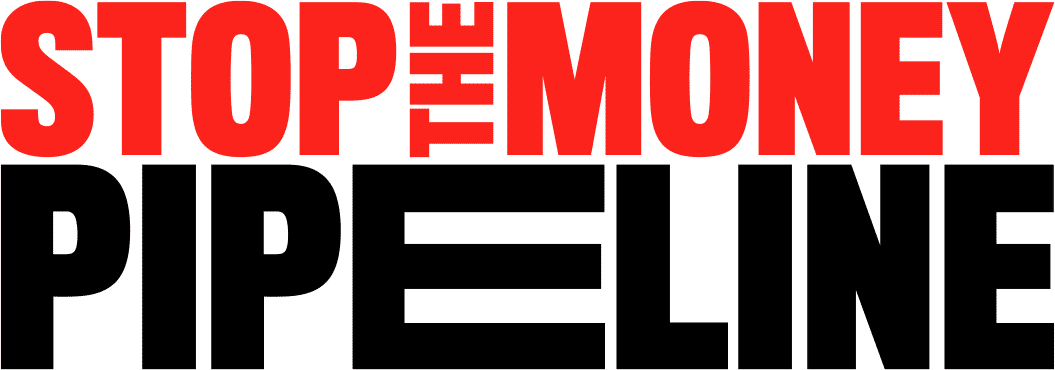Activists target JP Morgan Chase, Liberty Mutual, and BlackRock for funding the Line 3, Trans Mountain, and Keystone XL pipelines
Stop the Money Pipeline, a coalition of over 130 organizations working to end the financing of climate destruction, is hosting a Day of Action this Friday, October 2 to pressure major financial institutions to stop funding tar sands, some of the dirtiest, most carbon intensive fuel on the planet.
Protests in cities like Boston, New York, San Francisco, Minneapolis, and Chicago, as well as outside the US in Bristol, London, and Vancouver, will target financial institutions like Liberty Mutual, JP Morgan Chase, and BlackRock that are funding tar sands pipelines like Keystone XL, Line 3, and the Trans Mountain pipeline.
These pipeline projects are disastrous for both people and the planet. They’re built on Indigenous lands without consent, endanger the safety of Indigenous women, and poison nearby communities.
With the COVID-19 pandemic underway, organizers have had to get creative. While the offline, socially-distant protests are underway, they will be linked together in a digital rally featuring frontline tar sands fighters who will connect the dots between the pipelines threatening their homes and the money behind the projects.
Press are welcome to join the digital rally which will take place from 2:00-3:30pm ET on Friday. Speakers will include:
- Tara Houska, Couchiching First Nation and Giniw Collective
- Kanahus Manuel, Secwepemc Ktunaxa First Nation and Tiny House Warriors
- Jasilyn Charger, Cheyenne River Sioux and International Indigenous Youth Council
- Jean L’Hemmecourt, Fort McKay First Nation
- Nigel Robinson, Cold Lake First Nation
- Nina Berglund, Northern Cheyenne and Oglala Lakota, Earth Guardians
- Lucy Molina, Frontline community organizer, resisting Suncor tar sands refinery in Commerce City, CO
RSVP for the event at: https://stopthemoneypipeline.org/tar-sands/
Friday’s protests will take place against the backdrop of ongoing climate catastrophes unfolding across the United States and around the world. They also come as financial institutions are beginning to acknowledge their role in driving the climate crisis, but have so far failed to take the necessary steps to address the problem, namely stopping the finance of fossil fuels and deforestation and starting to respect human rights and Indigenous sovereignty.
Interviews are available with the speakers at Friday’s digital rally, as well as other activists and experts who can explain how major financial institutions are continuing to drive the climate crisis.
More information on the targets of Friday’s protests:
This Friday’s “Stop Funding Tar Sands: Day of Solidarity with Frontline Communities” will target the major financial institutions that are behind controversial tar sands projects like the Keystone XL, Line 3, and Trans Mountain pipelines.
The organizers’ goal is to shine a spotlight on three major financial institutions, JP Morgan Chase, Liberty Mutual, and BlackRock, that are financing, insuring, and investing in three of the most dangerous fossil fuel projects in North America: the Line 3, Trans Mountain, and Keystone XL pipelines.
Line 3 would run across Anishinaabe territory and Ojibwe treaty lands in Minnesota to refineries on Lake Superior; Trans Mountain across lands in British Columbia belonging to First Nations including Squamish, Tsleil-Waututh, Coldwater and a collective of bands within the Sto:lo Nation; and Keystone XL across the Fort Belknap Indian Community of Montana, the Rosebud Sioux Tribe of South Dakota, and lands in Nebraska.
Each pipeline would transport Canadian tar sands, some of the dirtiest fossil fuels on the planet, and would be constructed on Indigenous lands without consent, endangering the safety of Indigenous women, and violating Indigenous People’s right to Free Prior and Informed Consent.
Along with fighting the pipelines on the ground, Indigneous leaders and their allies have been going after the financial institutions that are funding the projects.
JPMorgan Chase is the number one U.S. banker of tar sands oil, financing more tar sands between 2016 and 2019 than the other five big U.S. banks combined. During that period, Chase provided TC Energy, the company behind the Keystone XL pipeline, with $17.5 billion in financing, making TC Energy the bank’s single largest fossil fuel client. Despite the bank’s green rhetoric, its tar sands financing jumped 65% from 2018 to 2019.
Liberty Mutual is also a key player in the tar sands. The insurance company is insuring the Trans Mountain pipeline in Canada as well as providing key financial backing for the Keystone XL pipeline: Liberty Mutual provided a $15.6 million bond to TC Energy, the company behind the project, to cover any damages to public infrastructure in South Dakota that could result from constructing the pipeline. While information on eight insurers of the Line 3 pipeline isn’t publicly available, it’s highly likely that Liberty Mutual is one of them. Liberty Mutual currently has no policies in place to steer clear of projects that have not secured the Free, Prior, and Informed Consent of Indigenous communities.
On September 15th, the Chairmen of sixteen sovereign Tribal Nations wrote to Liberty Mutual CEO, David Long, to demand that Liberty Mutual immediately cut ties with the Keystone XL pipeline and meet with them to discuss Liberty Mutual’s involvement in the whole tar sands sector. This was followed the next day by sixty major businesses calling on insurers to cease doing business with the fossil fuel industry.
Despite BlackRock’s promises to put sustainability at the center of its business model, , it remains the world’s top backer of fossil fuels and deforestation. While BlackRock made headlines for excluding tar sands from a single ESG fund, it has no policies in place to stop its other funds from investing in them. BlackRock is also a major investor in TC Energy and Enbridge, the companies behind Keystone XL, Line 3, and Trans Mountain. Furthermore, BlackRock is a top shareholder of many of the largest banks financing tar sands and pipeline expansion. BlackRock has also failed to incorporate Indigenous rights into any of its investment screens.
###

